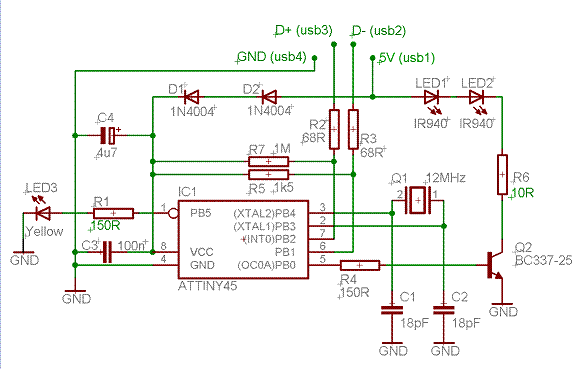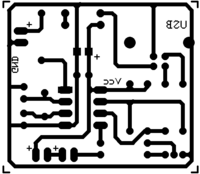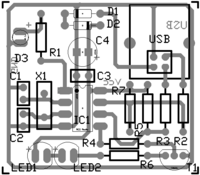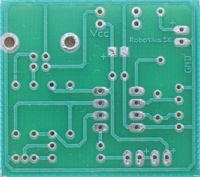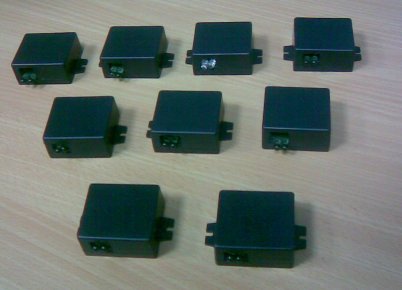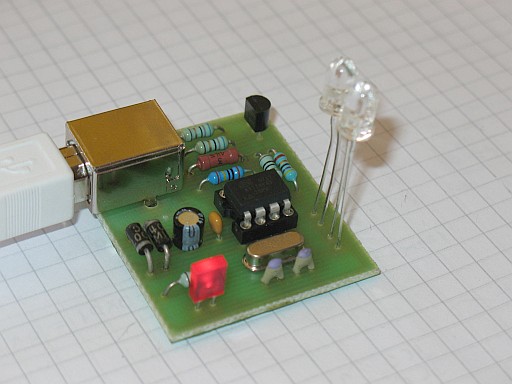Difference between revisions of "SapienIRCTL"
(→Board) |
|||
| (2 intermediate revisions by the same user not shown) | |||
| Line 1: | Line 1: | ||
| + | == Description == | ||
| + | |||
| + | SapienIRCtl provides an IR control of robot devices that are normally | ||
| + | controlled by hand-held remote control, such as RoboSapien V1, V2, or i-Sobot. | ||
| + | It is a follow-up on a similar project where these | ||
| + | robots can be controlled using LEGO serial IR tower, however, these | ||
| + | devices are not produced anymore, and they are not very suitable, | ||
| + | since the host PC must control the whole signal. In our case, the | ||
| + | ATtiny45 receives the code to be send to the robot over USB line, | ||
| + | and then generates the signal using two timers, one used for PWM | ||
| + | and one used for the 1200Hz/1800Hz time-unit frequency interrupt. | ||
| + | We used the low-cost 8-pin ATtiny45, which seems to be sufficient | ||
| + | |||
| + | This device is derived from [http://www.obdev.at/products/avrusb/ AVRUSB project] | ||
| + | |||
| + | |||
== Schematic diagram == | == Schematic diagram == | ||
| − | + | [[Image:SapienIRCTL.gif|Schematic]] | |
| Line 18: | Line 34: | ||
R2,3 68R | R2,3 68R | ||
R5 1k5 | R5 1k5 | ||
| − | R6 | + | R6 10R |
R7 1M | R7 1M | ||
| − | + | ||
C1,2 18pF | C1,2 18pF | ||
C3 100n | C3 100n | ||
C4 4u7 | C4 4u7 | ||
| − | + | ||
D1,2 1N4004 | D1,2 1N4004 | ||
D3 LED Yellow | D3 LED Yellow | ||
LED1,2 IR940 | LED1,2 IR940 | ||
| − | + | ||
IC1 ATTINY45 ATTINY45 SOIC8 | IC1 ATTINY45 ATTINY45 SOIC8 | ||
X1 12MHz XTAL/S | X1 12MHz XTAL/S | ||
| − | + | ||
T1 BC337-25 TO92 | T1 BC337-25 TO92 | ||
| − | + | ||
socket DIL8 | socket DIL8 | ||
USB connector | USB connector | ||
| Line 41: | Line 57: | ||
== Photos == | == Photos == | ||
| − | [[Image:SapienIRCTL.jpg]] | + | [[Image:SapienIRCtl9.jpg]] |
| + | |||
| + | [[Image:SapienIRCTL.jpg]] | ||
| + | |||
| + | |||
| + | == Software == | ||
| + | |||
| + | After the device is plugged | ||
| + | to USB port for the first time, you need to tell Windows | ||
| + | to use a specific driver that is located in the commandline/windows-driver | ||
| + | subdirectory. Once the driver is installed, you can use the commandline | ||
| + | utility sapienirctl.exe to emit the RoboSapien V1, RoboSapien V2, and | ||
| + | i-Sobot codes. | ||
| + | |||
| + | You can download the last version of the release from [http://webcvs.robotika.sk/cgi-bin/cvsweb/robotika/src/avr/sapienirctl/release/ CVS release directory], and check for the last CVS files in the [http://webcvs.robotika.sk/cgi-bin/cvsweb/robotika/src/avr/sapienirctl/ CVS repository]. | ||
| + | |||
| + | This device can in principle control wide range of remotely controllable | ||
| + | devices - such as TV sets, HiFi, other remotely-controlled robots, etc. | ||
| + | |||
| + | |||
| + | == Ordering == | ||
| + | |||
| + | We have some spare devices that we can send you for the cost of parts that is about 15 EUR. Please let us know at | ||
| + | ppetrovic[[Image:zavinac.gif]]acm.org. | ||
| + | |||
| + | |||
| + | __notoc__ | ||
Latest revision as of 19:53, 18 July 2008
Description
SapienIRCtl provides an IR control of robot devices that are normally controlled by hand-held remote control, such as RoboSapien V1, V2, or i-Sobot. It is a follow-up on a similar project where these robots can be controlled using LEGO serial IR tower, however, these devices are not produced anymore, and they are not very suitable, since the host PC must control the whole signal. In our case, the ATtiny45 receives the code to be send to the robot over USB line, and then generates the signal using two timers, one used for PWM and one used for the 1200Hz/1800Hz time-unit frequency interrupt. We used the low-cost 8-pin ATtiny45, which seems to be sufficient
This device is derived from AVRUSB project
Schematic diagram
Board
Partlist
Part Value R1,4 150R R2,3 68R R5 1k5 R6 10R R7 1M C1,2 18pF C3 100n C4 4u7 D1,2 1N4004 D3 LED Yellow LED1,2 IR940 IC1 ATTINY45 ATTINY45 SOIC8 X1 12MHz XTAL/S T1 BC337-25 TO92 socket DIL8 USB connector plastic box
Photos
Software
After the device is plugged to USB port for the first time, you need to tell Windows to use a specific driver that is located in the commandline/windows-driver subdirectory. Once the driver is installed, you can use the commandline utility sapienirctl.exe to emit the RoboSapien V1, RoboSapien V2, and i-Sobot codes.
You can download the last version of the release from CVS release directory, and check for the last CVS files in the CVS repository.
This device can in principle control wide range of remotely controllable devices - such as TV sets, HiFi, other remotely-controlled robots, etc.
Ordering
We have some spare devices that we can send you for the cost of parts that is about 15 EUR. Please let us know at
ppetrovic![]() acm.org.
acm.org.
